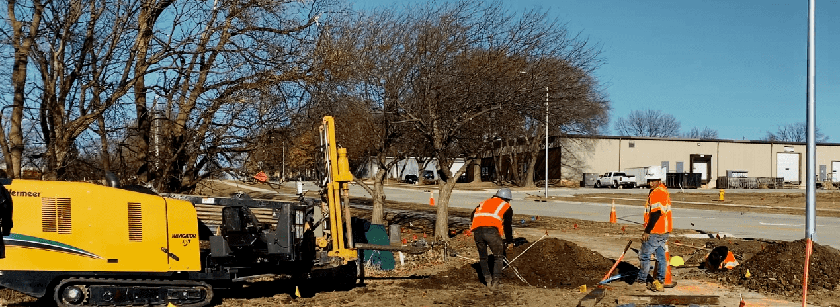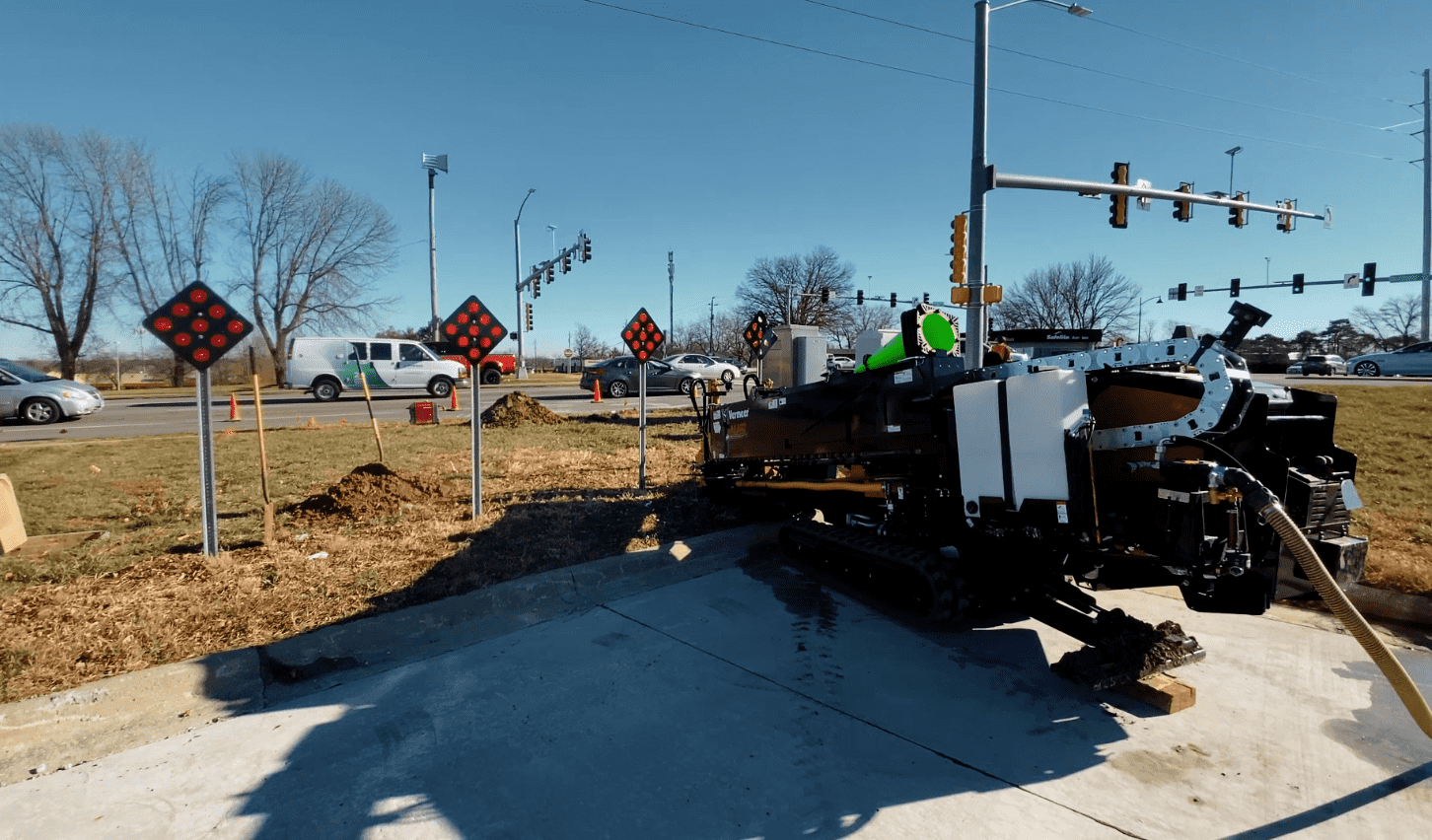New Fiber Internet Fuels Essential Connections

How dramatically did life change after the COVID-19 lockdowns in 2020? For many of us, home suddenly became a workplace, school, entertainment center and movie theater, all in one. This quick transformation also exposed a big weakness in the one thing that makes all this possible — the internet.
“You hear about the urban-rural digital divide, but there’s also a digital divide in metro areas,” said Scott Cirksena, mayor of Clive. “It’s a dilemma when some neighborhoods lack fast, high-quality internet service.”
Sometimes only one company provides internet service in a neighborhood, limiting options. In other areas, outdated infrastructure thwarts internet speed and reliability.
That’s why Clive, Johnston and Urbandale are welcoming the addition of another high-speed, fiber internet provider to local residents. The opportunity arose when MetroNet, a Midwestern-based, fiber-optic telecommunication company, proposed a major investment in northwest Greater Des Moines (DSM). This is a 100% private business project and no public funds are being used. With this investment, MetroNet will join a number of other private companies providing fast and reliable fiber internet, television and phone service in Clive, Johnston and Urbandale.
Fiber installation started in early 2021 and when complete, fiber internet service will extend to roughly 95% of the three communities. This is expected to improve high-speed internet accessibility, affordability and competition in the market.
“The internet has become such a critical part of modern daily life,” Cirksena said. “This project couldn’t have come at a better time.”
New Demands Overwhelm Outdated Internet Connections
The COVID-19 pandemic threw into stark relief how costly it is to be without high-quality internet service. For students, a lack of fast, reliable internet service hinders learning. For employees and entrepreneurs, it stymies the ability to work. For patients using telemedicine, it makes it harder to visit their doctor. For families and friends, it’s tougher to stay connected.
With all the ways the internet has become integrated into daily living, it’s easy to forget that home internet service was practically unheard of 25 years ago. The internet was just starting to become more widespread in universities and offices by the mid-1990s. “I was issued my first laptop computer for business in 1995,” Cirksena recalled. “When I’d travel for business and needed to work, I’d plug the computer into the phone line to get internet service.”
By the late 1990s, things were changing fast with services like America Online. The internet quickly become mainstream in many homes, as people went online with 56K modems and dial-up service. This meant tying up the phone line, as one modem connected with another, accompanied by the distinctive sounds of static and electronic screeches.
While dial-up service transitioned to DSL and faster options like fiber internet, building the infrastructure to support the latest technology hasn’t always been easy. In the past year, Johnston has invited residents to complete an online survey to evaluate existing broadband connectivity in neighborhoods and explore ways to improve broadband service for residents and businesses. “People are concerned about internet speeds and reliability, based on feedback we’re getting,” said Adam Plagge, economic development manager for the City of Johnston.
Long gone are the days when going online meant browsing a few webpages or just checking email. “Everyone in the house is using the internet for so many things,” Cirksena said. “It’s essential for business video conferencing and cloud storage, online classrooms, home entertainment and gaming, Wi-Fi and more.”
Demands on internet connectivity only continue to rise. “We don’t have cable or satellite TV anymore because we stream what we want to watch,” said Matt McQuillen, city manager of Clive. “I’d never go back.”
For the past four years, McQuillen’s wife has also worked from home for an Australia-based tech firm with U.S. headquarters in the Silicon Valley. “Nearly 75% of her time is spent working remotely, so good internet service is vital,” he said.
Work-from-home arrangements are increasingly common. Telecommuting on a regular basis has grown 115% in the past decade, according to the 2017 State of Telecommuting in the U.S. Employee Workforce Report. This trend has only accelerated during the COVID-19 pandemic.
Slow, unreliable internet connections, however, can wreak havoc on businesses, from reduced productivity to unintended downtime. Some studies indicate that slow internet connections cost employees one week per year of productivity.
Beyond business, inferior internet service hampers the quality of life, whether you’re a student trying to learn new skills or you’re a senior adult trying to make wellness a priority. “The COVID-19 pandemic revealed the need for more virtual learning opportunities for people of all ages,” said Mollie Wilhite, recreation superintendent for the City of Urbandale’s Parks and Recreation Department. “While we did a little online learning this past summer, we want to do more to help bridge the digital divide.”
Faster Internet for Everyone
Fiber internet helps solve many of these issues. This next-generation technology can transfer lots of data quickly, making it the fastest internet available. Some parts of the northwestern Des Moines suburbs already have fiber internet service, but there’s room for growth, McQuillen said.
The challenge? Fiber is expensive to install. “There’s an expectation from residents today that high-quality internet connectivity is a basic service, like water or electricity,” Cirksena said. “It’s a gamble, though, for internet providers to make the kind of investments required to bring fiber internet to a community.”
Working with several communities at the same time makes economies of scale possible for a fiber internet provider. Cirksena is excited that MetroNet is willing to make these extensive investments. “This will give people more choices for enhanced levels of internet service,” Cirksena said.
From a practical standpoint, fiber internet service means no choppiness or delays during a videoconference call. It allows good Wi-Fi reception throughout your home or outdoor living areas. “Overall, it gives you a much better experience, whether you’re on the internet for work or other uses,” McQuillen said.
New competition in the internet service market will likely impact the service and pricing offered by legacy providers, which should benefit residents. “It’s great to be part of an area where private businesses are competing hard to serve our cities,” said Peter De Kock, assistant city manager for the City of Clive.

Working Smarter, Living Better
The northwest suburbs’ track record of working together helps attract new opportunities like this. “We have a history of regional cooperation,” McQuillen said. “We’re in this together.”
Consider Fire Station #43, which Clive and Urbandale built together recently. This provides emergency services to the growing neighborhoods in both cities, while using taxpayers’ money efficiently. “Expanded fiber internet infrastructure will be another example of how working together makes life better throughout our communities,” McQuillen added.
Fiber internet is a game-changer for four key reasons, including:
- Business growth. As telecommuting becomes the norm, fast, reliable internet service is essential. “We have a lot of entrepreneurs in Johnston who work from home, so we welcome this opportunity to improve fiber internet service,” Plagge said.
- More opportunities for learning and fun. High-speed internet service keeps the community connected, from students to senior adults. The possibilities are especially exciting for Making a Connection (MAC) Camp in Urbandale. Now in its 11th year, this eight-week program helps 100+ students in grades 1 through 5 improve their reading ability, learn career skills and more. Kids enjoy visits from former campers who are now student-athletes at Iowa State University and Northern Illinois University. “This camp is amazing,” Wilhite said. “The whole focus is playful learning and helping kids get comfortable with the idea that higher education is a possibility for them.” While MAC Camp was disrupted in 2020 by the COVID-19 pandemic, Wilhite and her team offered “Camp in a Box,” distributing boxes filled with educational games, books, science experiments and links to educational websites. “It’s exciting to think about all the ways fiber internet will open up so many more learning opportunities,” Wilhite said
- Improved quality of life. Senior adults were hit especially hard by the COVID-19 lockdowns and lack of in-person gatherings. “Pre-COVID, we’d have up to 75 people in some of our classes,” said Carissa Williams, senior recreation center supervisor for the City of Urbandale’s Parks and Recreation Department. “We’d also take day trips around Iowa and the Midwest.” When all that ended abruptly, Williams and her team shifted to online classes and virtual tours. They offer online fitness classes several days a week for adults in the 55+ age group. They also provide an online Iowa history series where participants have “toured” the Surf Ballroom in Clear Lake, the Grotto of the Redemption in West Bend, the Iowa State Fair and more. “Not only do we promote physical and mental well-being, but friendships form through our programs,” Williams said. “We’re really excited about the ways fiber internet can help our seniors stay connected to the community, especially during these challenging times.”
- Economic development. Fiber internet frees people to live and work where they want. “It’s exciting to think about the types of investments and other opportunities that will flow from this,” Cirksena said. Don’t be surprised if there’s economic migration away from the coasts and major metro areas to central Iowa, McQuillen added. “We have excellent schools, safe neighborhoods, great recreational opportunities and affordable homes in the Des Moines metro. My friends in Austin, Texas, are impressed we’ll soon be able to get up to 1 gig internet service here.”
What to Expect Next
The buildout of the new fiber internet system could take approximately 18 months. This means heavy equipment will be a common sight in neighborhoods as crews install the infrastructure.
“It will be disruptive at times,” Cirksena said. “We want to ensure the process is as smooth as possible, though. City leaders in Clive, Johnston and Urbandale will keep the lines of communication open with residents and businesses as this project progresses.”
The long-term benefits of fiber internet far outweigh any short-term challenges. “More access to high-speed internet will give our communities another big advantage,” McQuillen said.
Named the #1 Best Place to Live in the Midwest and #2 Safest Place to Live, Greater Des Moines (DSM) is a city where you can have it all. Learn more about what it’s like to live here.
Throughout Greater Des Moines’ (DSM’s) eight-county region, a thriving economic environment is attracting more Investors to do business. Learn more about other recent development projects in the region.
Derek Zarn
Derek Zarn is the marketing and communications specialist for the City of Urbandale.